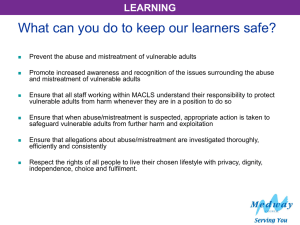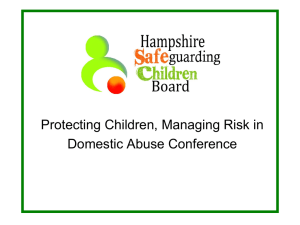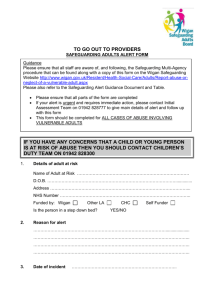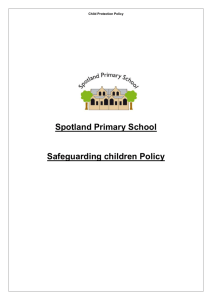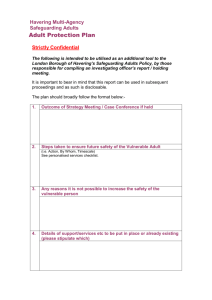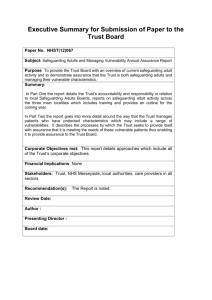Safeguarding Adults Policy
advertisement
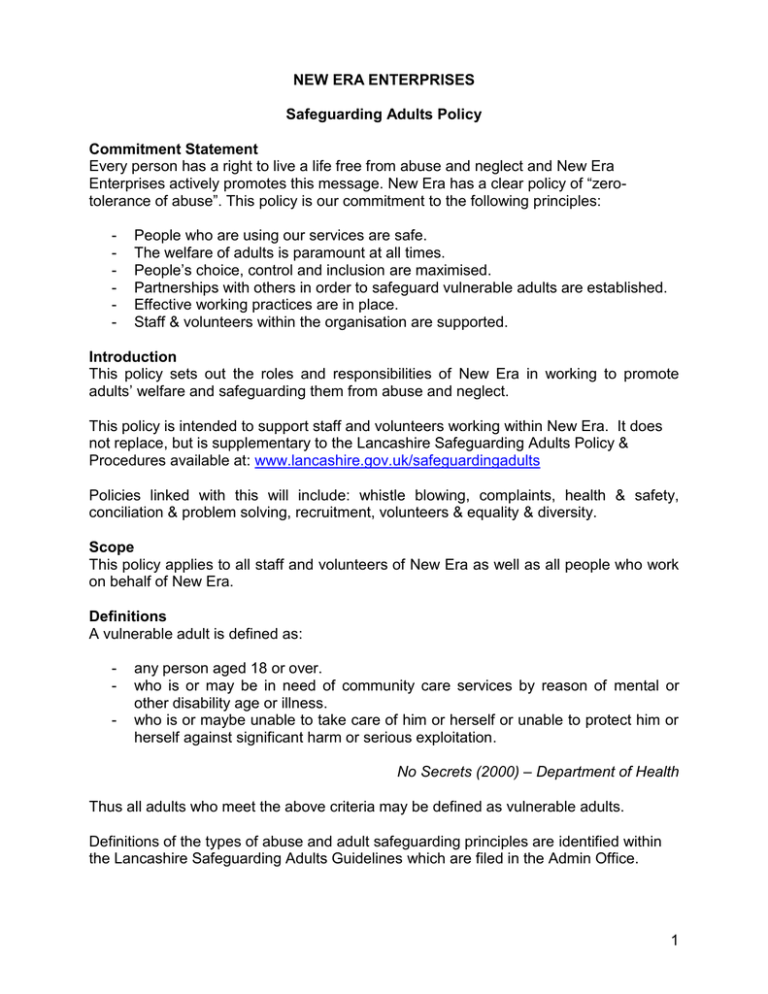
NEW ERA ENTERPRISES Safeguarding Adults Policy Commitment Statement Every person has a right to live a life free from abuse and neglect and New Era Enterprises actively promotes this message. New Era has a clear policy of “zerotolerance of abuse”. This policy is our commitment to the following principles: - People who are using our services are safe. The welfare of adults is paramount at all times. People’s choice, control and inclusion are maximised. Partnerships with others in order to safeguard vulnerable adults are established. Effective working practices are in place. Staff & volunteers within the organisation are supported. Introduction This policy sets out the roles and responsibilities of New Era in working to promote adults’ welfare and safeguarding them from abuse and neglect. This policy is intended to support staff and volunteers working within New Era. It does not replace, but is supplementary to the Lancashire Safeguarding Adults Policy & Procedures available at: www.lancashire.gov.uk/safeguardingadults Policies linked with this will include: whistle blowing, complaints, health & safety, conciliation & problem solving, recruitment, volunteers & equality & diversity. Scope This policy applies to all staff and volunteers of New Era as well as all people who work on behalf of New Era. Definitions A vulnerable adult is defined as: - any person aged 18 or over. who is or may be in need of community care services by reason of mental or other disability age or illness. who is or maybe unable to take care of him or herself or unable to protect him or herself against significant harm or serious exploitation. No Secrets (2000) – Department of Health Thus all adults who meet the above criteria may be defined as vulnerable adults. Definitions of the types of abuse and adult safeguarding principles are identified within the Lancashire Safeguarding Adults Guidelines which are filed in the Admin Office. 1 When Abuse is Suspected Who abuses? Abuse, wherever it happens and whoever perpetrates it, must not be ignored. Anyone can be an abuser and abusers have been known to be: - spouses / partners - carers / care workers - family members / relatives - friends - neighbours - volunteer helpers - professionals - strangers What is abuse? - When someone’s human and civil rights are violated by someone else. - A single or series of actions of abuse. - Deliberately or unknowingly causing harm or distress to someone else. - Failure to protect people from abuse. Types of abuse Abuse can be physical, emotional & psychological, financial or material, discriminatory or neglect. What to do if someone tells you that they are being abused? You must: - Stay calm and try not to show shock or disbelief. - Listen carefully to what is being said. - Do not ask detailed or probing questions. What do you tell the vulnerable person who discloses abuse? - They were right to tell you. - The information is being treated seriously. - It was not their fault. - Give them information about the steps that will be taken, including any emergency action to address their immediate safety, health and well-being. Do not: - Stop someone who is freely recalling significant events, as they may not tell anyone again. - Promise to keep secrets, instead explain the information will only be passed to those who “need to know”. - Make promises that you cannot keep, such as “this will not happen to you again”. - Contact the alleged the perpetrator or anyone who might be in touch with them. - Be judgemental, eg “why did you not tell them to stop and go away”. - Tell anybody who does not need to know i.e. gossip. 2 Who is the Alerter? Anybody can be an alerter and is someone who reports a concern that an adult may be experiencing abuse or neglect. You are not being asked to verify or prove that the information is true. All staff & volunteers will have access to the safeguarding policy and procedures so that they know how to make alerts where appropriate. You may be told about the abuse by the service user themselves, by someone else who knows or works with them, or you may notice signs that abuse or neglect is taking place. The procedure for safeguarding adults is documented in the Lancashire Safeguarding Adults Multi-Agency Procedure Version 2, March 2010. Who do I tell and when? - Inform an appropriate manager / professional or someone in authority, immediately (unless it is suspected that the line manager is implicated – in such circumstances the whistle blowing policy should be followed). - Where appropriate the manager will seek consent with the adult at risk and the line manager / professional or the person in authority will make the alert. If in doubt as to whether an alert should be made, the case can be discussed in the first instance with your line manager. However, if the manager is implicated in the disclosure, then speak with an appropriate manager / professional who you can trust, without disclosing identifying details. The manager will: - take action to ensure the vulnerable person is safeguarded, to include their health and well-being. consider any additional ongoing risks, for example, suspension of an employee / volunteer. at the earliest opportunity and / or whenever possible, consult with the adult at risk to ask them about their views and what should happen next. The manager should ensure that: - - the alert is made where appropriate the police have been informed if a crime is suspected or known to have taken place or if staff feel the person needs urgent medical assistance, they have called for an ambulance or arranged for a doctor to see the person at the earliest opportunity the lead person for safeguarding adults within their organisation has been made aware and their advice has been sought. where there are allegations of abuse an alert form needs to be sent to the Safeguarding team. Guidance notes are available in the Safeguarding Adults folder. 3 Alleged abuser and victims who are both service users It is important that consideration be given to a co-ordinated approach where it is identified that both the alleged abuser and alleged victim are service users. Where both parties are receiving a service, staff should discuss cases and work together, however meetings with both the alleged abuser and alleged victim in attendance, are not considered appropriate. Allegation of abuse staff member Staff should be aware that abuse is a serious matter that can lead to a criminal conviction. Where applicable, New Era’s disciplinary policy should be implemented. Making the alert All service users need to be safe. Throughout the process the service users’ needs remain paramount. This process is about protecting the adult and prevention of abuse. Incidents or concerns about abuse or neglect can be reported by contacting the following: 9.00am – 5.00pm Customer Services Adult Social Care Services Lancashire County Council 0845 053 0028 5.00pm – 9.00am Emergency Duty Team Adult Social Care Services Lancashire County Council 0845 053 0028 9.00am – 5.00pm Public Alert Form www.lancashire.gov.uk/safeguardingadults To be completed online at: 9.00am – 5.00pm Partner Agency Alert Form www.lancashire.gov.uk/safeguardingadults To be completed online at: Remember: If someone is in immediate danger call the emergency services on 999 Responsibilities of New Era To follow the safeguarding policies and procedures at all times, particularly if concerns arise about the safety or welfare of a vulnerable adult. To ensure that all staff and volunteers who come in contact with vulnerable adults have a CRB check in line with the requirements of the Independent Safeguarding Authority Vetting and Barring Scheme. To become familiar with Lancashire County Council Safeguarding Adults Guidelines. To discuss any concerns about the welfare of a vulnerable adult with their line manager. To contribute to actions required including information sharing and attending meetings. To work collaboratively with other agencies to safeguard and protect the welfare of people who use services. To remain alert at all times to the possibility of abuse. 4 To recognise the impact that diversity, beliefs and values of people who use services can have. To provide support, advice and resources to staff in responding to safeguarding adult issues. To inform staff of any local or national issues relating to safeguarding adults. To ensure staff members are aware of their responsibilities to attend training and to support staff in accessing these events. To ensure staff have access to appropriate consultation and supervision regarding safeguarding adults. To participate in safeguarding adults training and maintain current working knowledge. Training All staff will receive a basic safeguarding adults awareness training at a level according to their role. This should be refreshed as a minimum every two years. Confidentiality and information sharing ‘No Secrets’ [DH 2000] states that the government expects organisations to share information about individuals who may be at risk from abuse. This is also stressed by Safeguarding Adults [ADSS 2005] the framework for good practice. It is important to identify an abusive situation as early as possible so that the individual can be protected. Withholding information may lead to abuse not being dealt within a timely manner. Confidentiality must never be confused with secrecy. Staff have a duty to share information relating to suspected abuse with Lancashire County Council Safeguarding Board and the Police. Consent is not required to breach confidentiality (capacity issues must be considered) and make a safeguarding referral where; a serious crime has been committed the alleged perpetrator may go on to abuse other adults other vulnerable adults are at risk in some way the vulnerable adult is deemed to be in serious risk there is a statutory requirement e.g. Children’s Act 1989, Mental Health Act 1983, Care Standards Act 2000 the public interest overrides the interest of the individual a member of staff of a statutory service, a private or voluntary service or a volunteer is the person accused of abuse, malpractice or poor professional standards. If a worker has any doubt about the legality of sharing information, they must in the first instance consult their manager. Monitoring This policy will be monitored and reviewed annually. Reviewed February 2014 5

